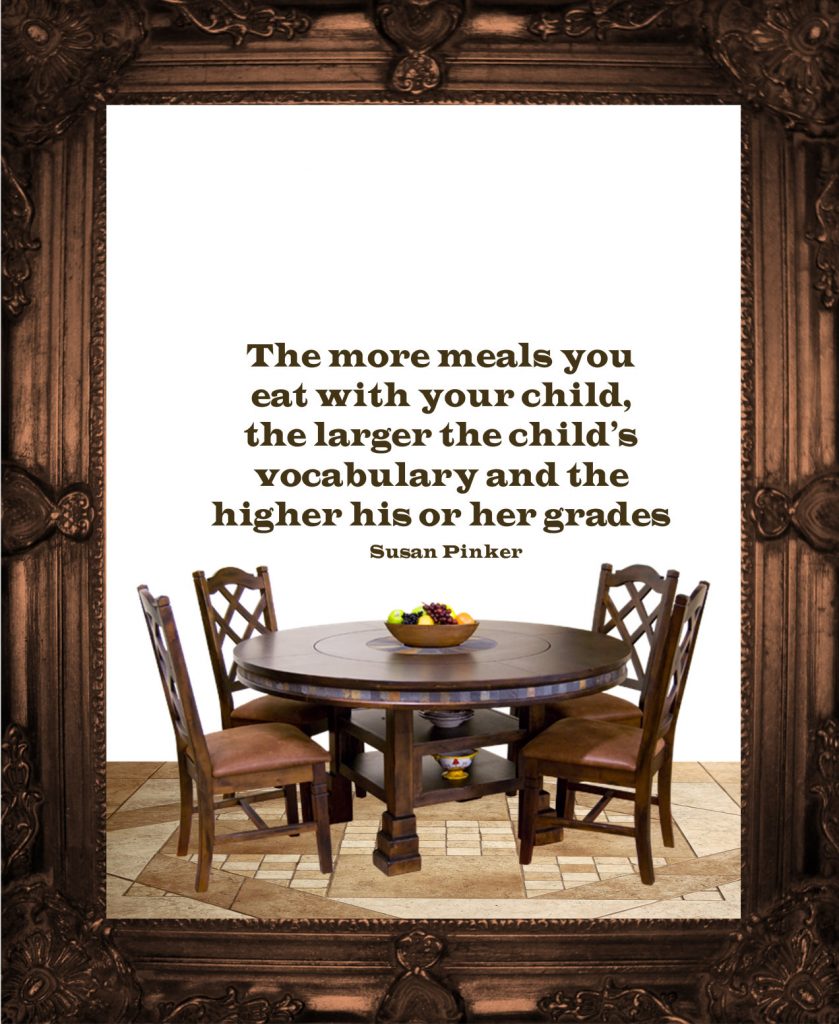We are wired for connection. We do better when we spend time together with other people. The first in a series…
Family meals are challenging these days. In fall, sometimes seemingly impossible between music lessons, sports teams, parental work demands. With each family member having a different but full schedule, figuring out how to get everyone around the table is a herculean challenge.
However, the family meal didn’t just evolve by accident.
Family meals serve vital purposes in families.
There are important reasons why we should not just give up the family meal around the table:
- Toddlers who eat dinner with family regularly develop language faster
- When kids are participate in dinner table conversations, they have opportunities to learn new words and develop their vocabulary. They get to practice producing and understanding stories and explanations. Children also acquire general knowledge, and learn how to talk in culturally appropriate ways. All of this promotes literacy.
- Parents connect with their kids, find out how they are doing, what’s happening. All the stuff of life–watching parents struggle and get through work stressors, work hard, challenge each other–is witnessed in ways that can prepare a child for the world.
- Academic performance tends to be higher in children and teens whose families spend mealtimes together.
- Families who eat dinner together may help reduce the risk of their teen using and abusing cigarettes and alcohol
- It’s a chance for kids to be with their parents…to be seen, to feel heard, to be loved.
- Families who eat dinner together are gathered together for one activity (eating) that allows for unstructured social contact. That allows family to “banter”…essentially to not have an agenda but have casual conversation. Children learn a lot about social relationships…turn taking, empathy, responding, being curious, having their own experiences of the day heard and then processed. This is the sort of stuff that is better experienced than taught formally. Mealtimes allow for life to happen–and that’s when kids learn best
- Girls who ate family dinner at least most days with their families are less likely to binge, purge, and diet frequently than girls who rarely or never ate dinner with families.

Tips for family meals:
- Opt for around the table facing each other rather than in front of a screen. For some who always eat in front of the TV, this can be awkward at first.
- Technology free: phones and other electronic devices are best not welcomed at the table. People can know that the dining room is a phone free zone, or everyone puts their phones in a basket that is passed around the table.
- If conversation is awkward, create some structure:
- Everyone brings a “rose and thorn” moment of the day–something good and a struggle
- Everyone brings a joke to tell or a news/sports story to share, or a fun fact to teach others
- Work to create a safe space for people to be together. If mealtimes are typically times of parents scolding kids, or quizzing them on why they aren’t doing better, children understandably withdraw.
- Balance quality of meal with the need to be relaxed and enjoy each other. If the meal preparer is so uber focused on the right balance of vegetables and protein and carbs, and setting a Pinterest-worthy table, s/he will be too stressed to enjoy the time with family.
Children want to enjoy you, and want to be able to enjoy you enjoying them.
- Use the entire experience of a family meal to enjoy together. Invite the children to help set the table, finish the salad before the meal, and everyone stands up together and gathers their arms full to take to the sink/dishwasher. Yes, children will complain about it. And no, it won’t kill them (even if they try to convince you otherwise). In our house, (after the complaining has subsided), the most entertaining parts of the meal are when the kids are sweeping up, and putting leftovers away. The silliness factor goes way up.
- It doesn’t have to take hours. 20 minutes together provides a densely packed set of benefits.
- Be creative. Finding times that work for everybody can be complicated. Family “dinners” may not work at suppertime during the week. Maybe regular breakfasts on the weekends? Maybe sandwiches together in the car or outside the gym before the sports practice? Maybe the kids have a hefty snack after school, and family dinner happens when the last parent gets home at 7:30? Family dinner a couple of times a week is better than not at all!
- There may be a season where schedule just doesn’t allow for family meal…spring soccer season, for instance. It’s important not to let family meals drop off the radar forever. Get back on track once the crunch is over.
Family meals seem like they are full of complaining, bickering, and whining.
Kids won’t seem grateful in the moment. They’ll want to continue their video game rather than come. They will complain when you suggest they stay sitting while others people finish their meal even after they are done. There will be many days when you want to throw everyone a sandwich and go to their room.
Please, remember, that family meals are worth it!
Series developed out of the work of Susan Pinker, a psychologist who writes The Village Effect and has a powerful TED talk:






Write a Comment